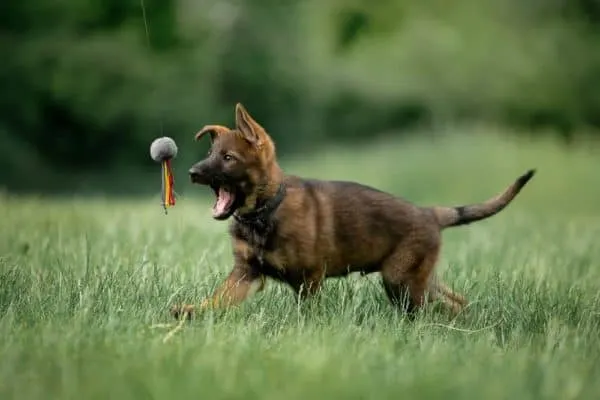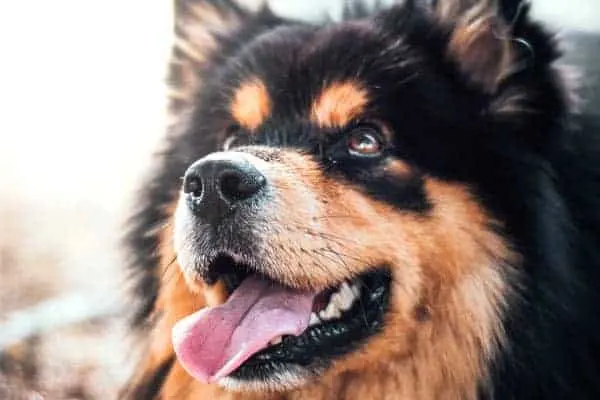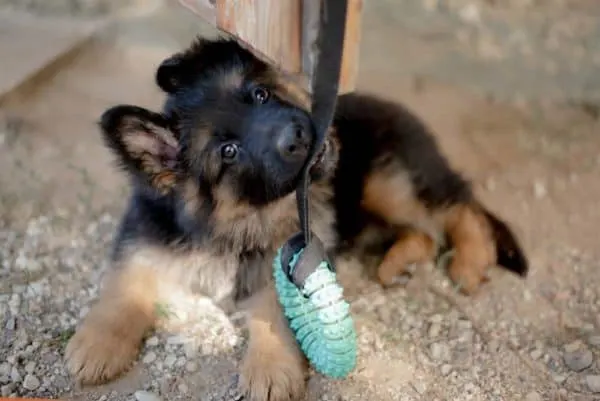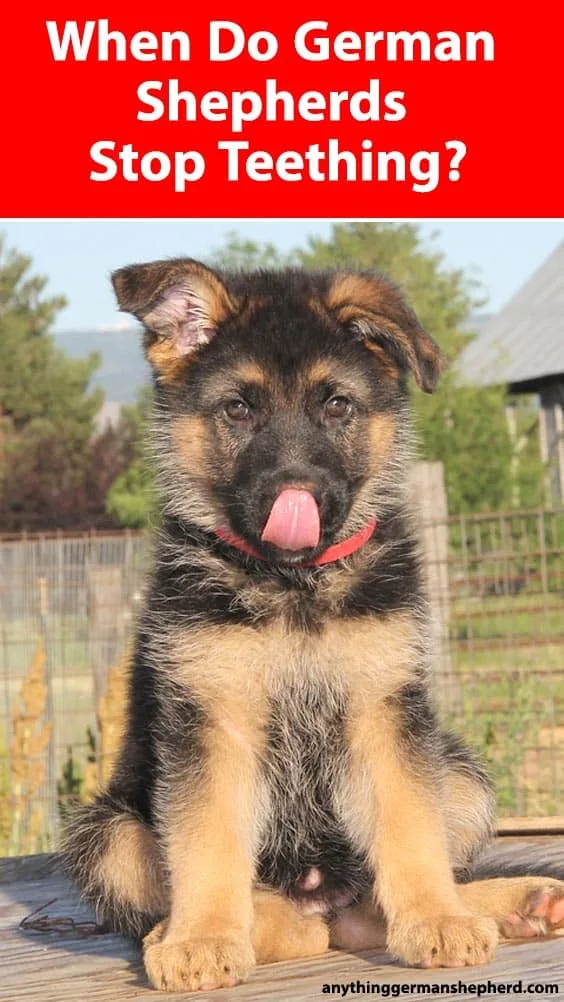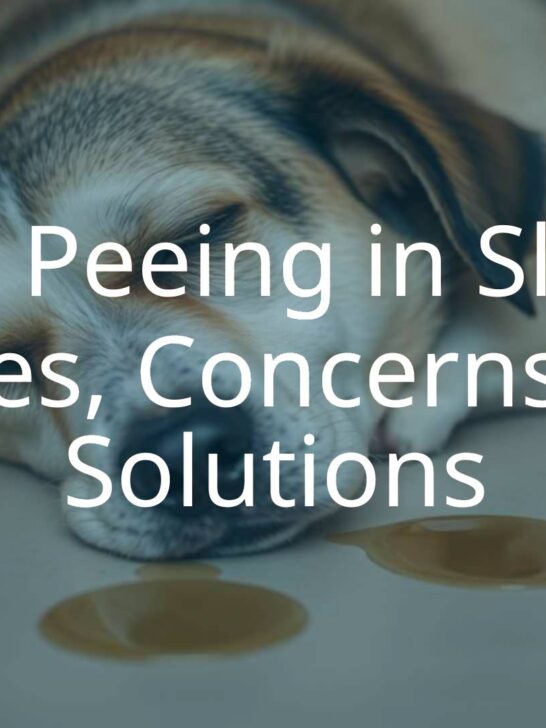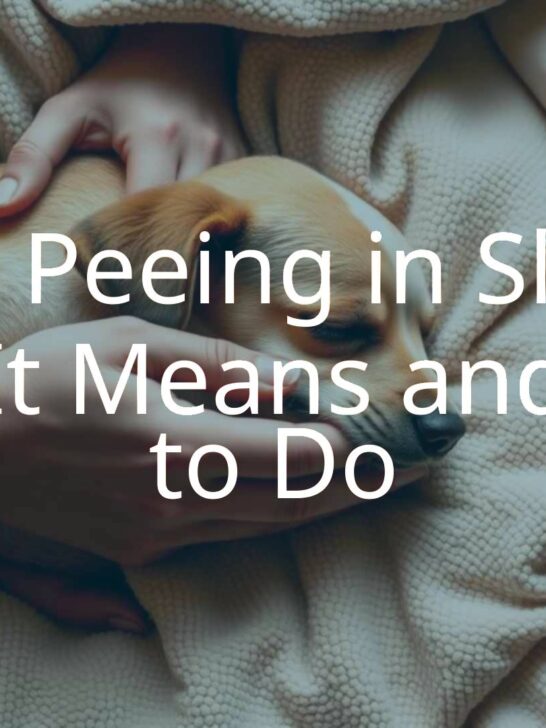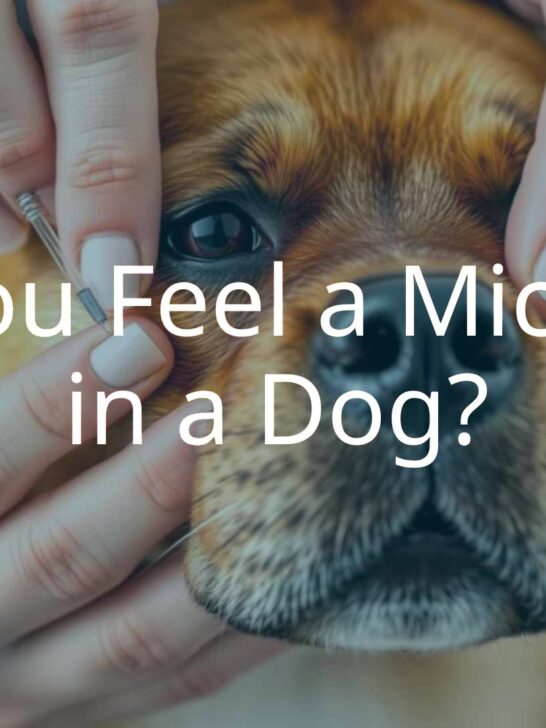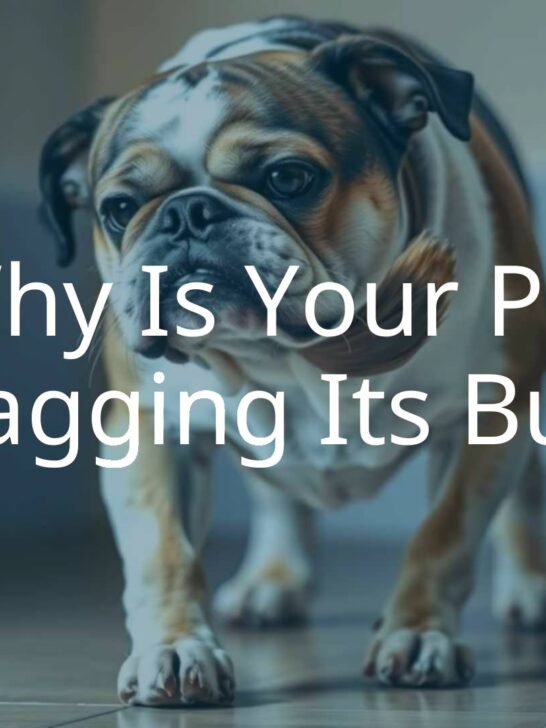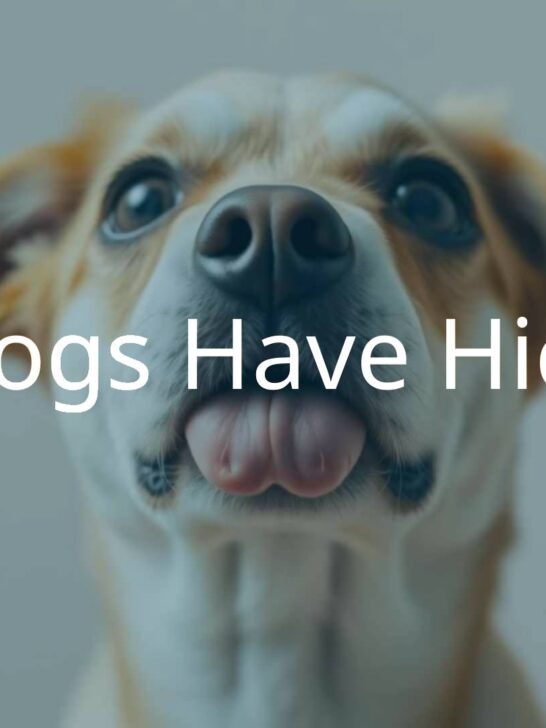When Do German Shepherds Stop Teething? Stages & Baby Teeth Timeline
First off, how many teeth do German Shepherds have? german shepherd puppies initially have 28 baby teeth, but later go on to develop 42 adult teeth by the time they have finished teething.
German Shepherds typically have their baby teeth for 6 to 8 weeks before they start teething.
The teething period usually lasts 4 to 5 months, and their canine teeth and incisors will arrive before they are 3 months old. Premolars, molars, and the carnassial tooth will come in before they are six months old.
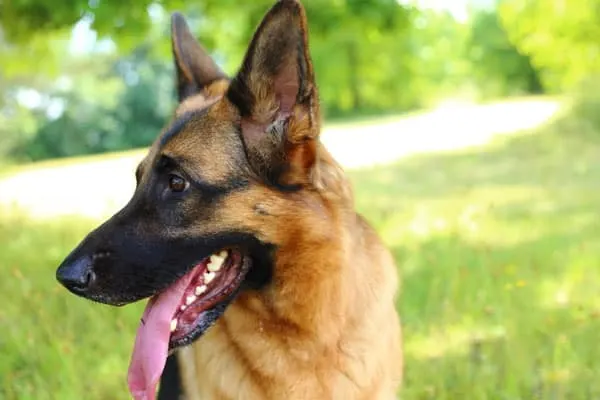
When Do German Shepherds Stop Teething?
It will take a German Shepherd puppy between 4 and 6 months to complete teething. During this time, you want to have your veterinarian check your puppy for any dental issues.
Surgery may be required if his bite needs to be corrected, which is meant to help with any potential eating issues in the future.
How To Recognize That Your Puppy Is Teething?
If your puppy is teething, he will start to chew more frequently on his chew toys. If he doesn’t have anything to chew on, he may start to chew on your shoes or furniture.
He doesn’t mean any harm by doing this, it simply helps to ease the pain of teething.
A German Shepherd puppy needs to lose his baby teeth before his adult teeth can take form. If your puppy is teething, you may start to notice that he is missing teeth, or you may find a missing tooth around your home.
Another sign that your puppy may be teething is if he has bleeding or swollen gums. You may even see some blood if his baby teeth are falling out.
You may also see some blood traces on his chew toys. If your puppy is drooling more than normal, this may be another sign that he is teething.
Your German Shepherd puppy may even show signs of physical distress, which can include weight loss if he refuses to eat, and becoming uninterested in playtime.
He could also experience diarrhea due to chewing on foreign objects, and could also develop a fever. In these situations, it may be necessary to consult your vet.
- Teaches appropriate chewing behaviour while offering mental enrichment
- Soft puppy KONG rubber formula is customised for puppy teeth and gums
- Unpredictable bounce for games of fetch
What Are The Teething Stages German Shepherd Puppies Go Through?
It may seem like your German Shepherd puppy’s teething period lasts for an eternity. The good thing is, this period lasts for a relatively short period. You’ll be enjoying life with your dog minus the most destructive chewing before you know it.
The teething process starts when the first baby teeth emerge, which will occur during the first month.
Even though puppies have no teeth at birth, they will have their baby teeth come in when they’re two to four weeks old. By six or seven weeks, you can expect your puppy to have 28 teeth instead of the 42 they will have as adults.
German Shepherd puppies will start to see adult teeth between six and eight weeks, as they begin to lose their baby teeth. This part of the teething stage is painful for puppies, with chewing being the primary form of seeking relief.
On rare occasion, your puppy might also swallow the baby teeth, but there is nothing to worry about because the teeth won’t harm your puppy.
German Shepherd adult teeth
All of the puppy’s adult teeth should be present at about six months of age, marking the end of the painful part of the teething process. Although when the adult teeth settle into the jawbone, there may be some more discomfort.
Some dogs can even have adult teeth coming in until they’re eight months old, and if yours still has baby teeth after this stage, follow up with your veterinarian. They will be able to determine if any teeth need to be removed to make room for adult teeth.
Even though abnormalities with the jaws are rare in Shepherds, it is a good idea to check your dog’s mouth to make sure their teeth are coming in correctly. You’ll be able to alert your vet a lot sooner if you’re keeping an eye on everything.
During the time your puppy is teething, it will need sufficient stimulation. Without it, your puppy’s teething stages will be harder on everyone involved, especially the dog trying to learn its place in their new family.
How To Help Your Teething German Shepherd Puppy?
Herbal plants like chamomile may help to alleviate your puppy’s pain. Try offering your dog some chamomile tea, and if he doesn’t like it, add some broth to the tea.
You can also give your puppy chew treats – there are a number of safe, high-quality ones that act as both a toy and food. These chew treats will also help to prevent your puppy from destroying your furniture!
Another way to help teething puppies is to make ice cubes from chicken, beef, or vegetable broth. You can also freeze aloe vera or fruit juice into ice cubes, and can then be rubbed on your puppy’s gums to soothe them.
Frozen baby carrots also work well. Chewing on these carrots will soothe your puppy’s gums while providing some extra nutrients.
There are also a number of puppy teething gels on the market that can give your German Shepherd puppy relief, but be sure to choose a teething gel that is safe and natural. They may include ingredients like chamomile, clove oils, and peppermint.
Rawhide is another inexpensive and popular option. When wet, it wraps around your puppy’s teeth, removing plaque, and can keep him busy for hours! Chewing rawhide will also help your puppy develop strong jaws.
However, it is important to supervise your puppy when he is chewing on rawhide, since choking is possible. Dogs that ingest a lot of rawhide can develop gastrointestinal issues, and some rawhides are not edible, so read the labels carefully.
- Clinically proven to reduce tartar build up
- Cleans plaque and tarter between teeth, all the way down to the gum line
- Includes 4-Packs of three different flavors: 32 original, 12 fresh, 18 Beef
Other ways to help ease the pain of teething
Flavored and treat-based toys provide a lot of fun for puppies. The treats or added flavors will help spark your dog’s interest. One of the best things about these types of toys is that they will keep your puppy busier for that much longer.
Puppy teething sticks have a rubber surface that helps soothe achy gums and teeth. Most of these sticks feature grooves that help clean teeth more effectively. The material is durable enough to withstand any chewer’s needs.
Sturdy toys with features like LED lights will help maintain your puppy’s attention for that much longer. Features like lights are often preferable to squeakers because they don’t present a part that the dog could end up trying to swallow.
You might also consider bones for your young German Shepherd to chew on. However, make sure you use beef marrow bones, instead of pork, chicken, or turkey bones. Non-beef bones can splinter too easily and cause serious injury.
Dental bones can also be helpful for your puppy. These bones help promote dental health, which is good to manage as early as possible in your dog. These bones are durable and also do not present the splintering hazard that other bones do.
One of the outcomes of using the right teething products should be having a puppy focused on something other than their mouth pain. The more controlled their mouth pain, the more your puppy can concentrate on obedience training.
How To Keep Your Puppy from Biting?
German Shepherd puppies may develop the habit of biting and nipping when teething. It may seem cute, but it is important to nip that behavior in the bud since it can become a habit that continues well into adulthood.
Most puppies learn bite inhibition before you bring them home, as these puppies are used to playing with their siblings and biting each other all day.
As they play with each other, they learn the bite tolerance levels of their siblings. If you have a lower pain tolerance than a puppy, you will have to teach them what yours is.
If your puppy bites you, make a sound of discomfort, pull away from him, and say ‘no’ in a firm voice. Your puppy will start to associate biting with the end of you playing with him and him receiving attention from you. Do this every time he bites and nips.
If this technique doesn’t work, there is another method we can recommend. The next time your puppy bites you during play, tell him ‘no’ in a firm tone.
Then, put your thumb under his tongue, and put your index finger under his chin. He will feel discomfort, and if you do this consistently, he will associate biting with discomfort.
If the biting continues, say ‘no’ as mentioned above. Pull away and pinch your puppy on the neck. Do this consistently, and he will associate biting with pinching.
Since puppies typically become wary of strangers at 18 months of age, it is important to start socialization as soon as possible.
You can try puppy playgroups and dog parks – this socialization will help them learn how to play nicely with others.
Training Your Teething Puppy
German Shepherds, like most dogs, respond well to consistency. When training your dog, it is important for your dog to see you as a leader which means you need to control your puppy’s behavior.
When you are training him, do not allow him to chew on your hands.
However, remember to reward good behavior. If your puppy is listening to you, reward him with a treat for learning something new, and make sure you always have enough treats on hand!
Also offer your puppy a treat if he stops biting you after you say ‘no’. As he gets better with the training, food treats can be replaced with cuddles.
What should I do if my German Shepherd chews something inappropriate?
Punishment is not the way to correct bad behavior. Physical punishment and yelling should be avoided.
Catching the dog in the act is the key to making discipline work effectively. If you scold the dog after the fact, they will not understand why they got into trouble. Quick diversion with a more appropriate chew toy works better.
One of the advantages of using diversion as a technique is that it teaches the puppy what to do, instead of only showing them what not to do. Positive training methods have a more significant overall effect on your puppy.
Picking the right chew toys makes a difference in your puppy’s adjustment to their teething phases. After all, you want this phase in your dog’s life to go as smoothly for everyone as possible, especially for the puppy in question.
Will teething impact a German Shepherd puppy’s training?
A common mistake that many people make is believing that training must be halted during the teething stages. Puppies can and should be trained during this time.
One thing to keep in mind is that training, by itself, won’t put a stop to the annoying chewing behavior. However, training will give your puppy a needed diversion that will hopefully keep the chewing under control.
Even if you train the puppy during teething, they will understand what is and is not appropriate behavior. This is key to a well-adjusted puppy.
The age where a puppy is still teething is a perfect time to do crate training. One of the best things about crate training is that it is an excellent way to get them acclimated to their own sleeping space, helping you reach two goals at once.
How Can You Puppy Proof Your Home?
When your puppy is teething, he wants to chew everything that is in his reach, which is why it’s important to puppy-proof your home.
Make sure to keep cleaning supplies and medicines out of your puppy’s reach, and cover any exposed cables. Also be sure to keep dangerous foods for dogs like chocolate and grapes well hidden.
If your German Shepherd is past the normal teething stage but is still chewing, anti-chew sprays can come in handy. These sprays will make whatever object the dog is chewing taste very unpleasant, allowing the sprays to serve as deterrents.
Can Exercise Help a Teething German Shepherd Puppy?
Jubilant Pups emphasizes the importance of giving a teething German Shepherd puppy sufficient exercise to help avoid needless destruction.
A useful rule of thumb for exercise is twice per day, with five minutes for each month of the puppy’s life. An example would be 15 minutes for a three-month-old puppy. Intervals of this length are sufficient for a puppy’s needs.
The advantage of twice-daily play sessions is making sure your puppy gets their exercise, without becoming too exhausted. You want your puppy calm, but not sick from overexertion.
Even though teething puppies will do a lot of chewing, sufficient exercise will help curb the worst behavior. Your puppy will be better-behaved overall, and less likely to chew inappropriately.
Nervous energy is behind a lot of undesirable behaviors like nuisance chewing. A more relaxed puppy is less likely to take out their frustration through chewing and other unwanted behaviors.
The period between the puppy initially losing their baby teeth and getting adult teeth will be one of the most challenging times where behavior is concerned. Try your best to remain patient with your puppy during this time.
Once your puppy has reached the age where adult teeth are settling in, start playing fetch with your dog. This is a perfect way to bond with your German Shepherd puppy through play.
Some of the benefits of fetch as an activity include increased stamina, endurance, and better-developed muscles. Your puppy will likely look forward to it.
Puppies and young dogs who get bored and don’t have an appropriate outlet for their frustration might be more likely to bite inappropriately. Even when German Shepherd Dogs still have puppy teeth, they can be very sharp and cause painful bites.
Keep Your Puppy’s Teeth Healthy
A German Shepherd’s puppy teeth should be brushed daily, if not several times per week, and is especially important once they have their adult teeth.
Daily brushing prevents tooth decay and other oral problems in puppy teeth. Choose a dog toothpaste when brushing as human toothpaste may upset his stomach.
You want to start brushing your dog’s teeth when he is a puppy, so he can get used to it. Keep regular appointments with your vet so they can keep track of the oral health of your dog.
Feeding your dog a healthy diet will also help to keep his teeth healthy. You can ask for dog food recommendations at your local pet store to promote oral health.
German Shepherd Gums
Typically, the german shepherd dogs have a bluish or black tongue along with grey or black-pigmented gums. The black spot is melanin, a natural pigment.
The color of your German Shepherd dog’s gums can tell you about his health. If the color of your German Shepherd’s gums suddenly changes, it can indicate an illness. If this happens, take your german shepherds to your vet as soon as possible.
Gingivitis is an inflammation of the German Shepherds gums, which develops when the plaque is not removed and causes the gums to be inflamed so the gums bleed easily. If you don’t treat this problem right away, it can become a more serious infection known as periodontitis.
Periodontitis is a German Shepherds gum disease that affects not only the gums but also other tissues around the teeth. This will result in bone loss.
Will Understanding The Teething Stages Make Life With My German Shepherd Dogs Easier?
Knowing when the various teething stages occur in a German Shepherd’s life will make it easier for you to get through this time. Even though it is a phase of relatively short duration, a teething puppy can leave a lot of destruction in their wake.
However, the more you know about the teething stages, the better you can help your puppy to adjust. When you know what to expect, you’ll be well-prepared to guide your puppy through this awkward part of the growing-up process.
Regardless of how frustrating it can be to live with a teething puppy, knowing when and how quickly they will go through the stages makes everything easier.
Frequently Asked Questions
How long does German Shepherd teething last?
German Shepherd puppies will go through four stages of teething. When your German Shepherd puppy is born, it will have no teeth, just like a human baby.
They will start to grow in their baby teeth when they reach about six weeks old, maybe seven or eight depending on the puppy.
Then at around 12 weeks, they’ll grow in the last of their milk teeth. By this point, your German Shepherd puppy will have up to 28 teeth.
At the 16-week mark, your puppy will start losing their baby teeth to get ready for their adult teeth to grow in.
By the time they are eight months old, your German Shepherd puppy should have grown in all 42 of their adult teeth.
It’s around this age that your puppy will stop teething or at least start to calm down a little, and by the time they reach one year they will definitely be out of the teething stage.
What can you give a teething German Shepherd?
You may have noticed that your puppy has started chewing everything they can get their paws on, and this is most likely due to teething.
In order to stop them chewing your shoes and furniture, you should make sure your German Shepherd puppy has lots of teething toys to chew on to soothe their gums and distract them from chewing things they shouldn’t be.
Ice cubes are also a cheap and easily accessible solution. Rubbing ice on your puppy’s gums will be nice and soothing for them. Or, let them sit and chew on a block of ice, this will keep them occupied while calming their gums.
You can also purchase puppy teething gel that contains soothing ingredients such as clove oils, peppermint and chamomile.














